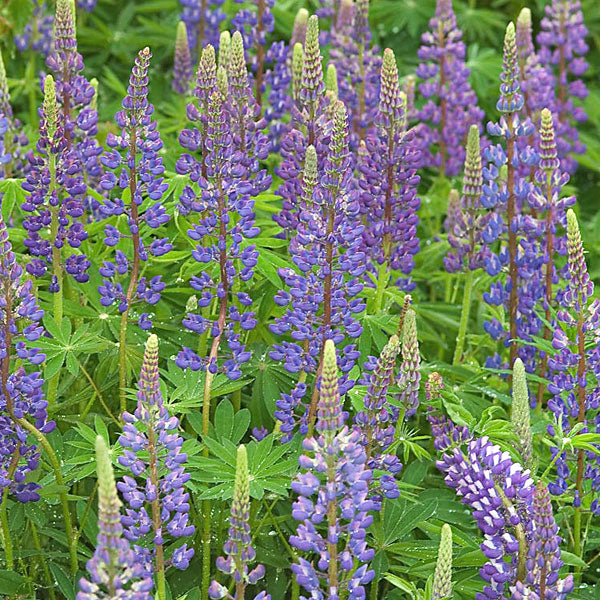Green Manure Lupins Seeds
Green Manure Seeds from Sow Seeds
Lupins 'Blue Sonet' is a hardy annual green manure that can be planted from March to July and is part of the legume family. They suit light sandy acid soils and soils up to pH8 and are a hardworking leguminous plant that has very long tap roots that dredge up minerals. Lupins fix 25% more free nitrogen than clovers and 28% more than peas and beans. The long roots also help to break up and aerate heavier soils and allow more moisture retention with the addition of humus from the breakdown of the roots on light sandy soils.
Lupin Blue Sonet produce a beautiful blue flower but it is best to dig it in and cut it down before they flower to help prevent them from seeding and then becoming a nuisance. The flowers are great for insects so a few could be left to flower to draw more insects into the vegetable area.
It is possible to sow Lupins as an intercrop, e.g. among long-growing varieties of veg like cabbage and sprouts, where they will contribute nitrogen to the soil (once they are dug in) and help promote growth in the veg crop. Treat as a legume for crop rotation purposes so great before nitrogen hungry crops like brassicas. Lupins can be slower to germinate than other green manures.
Did You Know?
That Lupins (Lupinus angustifolius) is a high-protein crop... the beautiful flowers are followed by large pods full of nutritious seed like a flattened bean. The kernels of Lupin are rich in protein (40%), fibre (40%) and moderate in fat (8%) made up largely of unsaturated fatty acids.
They are popular in Italy, often salted and served with a cold glass of beer!
COOKING: With young tender lupin seeds (in the green pod stage) you can just shell them out and boil them for 15 minutes or until soft. If cooking with dried lupin seeds then you will need to soak them overnight, then boil in fresh water for 40 minutes or until tender.
People who are allergic to peanuts can also react to eating lupin seed, so don't feed lupins to anyone with a peanut allergy.
Plant your Lupin seeds in spring (April onwards) in a small pot and transplant them out once about 4 or 5 inches tall. Maybe plant two seeds per pot as germination is often a bit erratic.
Need Some Help On Green Manure?
Then we have 2 invaluable resources on our website that will provide the answers to all of your Green Manure questions:
1. A Beginners Guide that covers everything you ever wanted to know about Green Manure in 5 quick and simple steps - read it [HERE]
2. How To Choose Which Green Manure To Sow...a summary of all the Green Manures showing which soil types, plant families, and benefits that each Green Manure can bring to your veg patch or allotment - read it [HERE]
Lupins Green Manure Seed Information
| When to Sow: | March, April, May, June, July. | |||||||||||||||
| Growing period: | 2-4 months. | |||||||||||||||
| Height: | Grows to a maximum height of c.60cm | |||||||||||||||
| Ideal Soil Type: | Light Sandy Acid Soils, also any soil up to pH8 | |||||||||||||||
| Nitrogen fixer: | Yes. | |||||||||||||||
| How to Sow: | Sow 2cms deep and 8cms apart in drills that are 15cms apart - this is why they are not very good at weed suppression. They can be slow to germinate too. | |||||||||||||||
| Care: | The green manure should be cut down before flowering when the stems are nice and soft as they decompose quicker, retain more beneficial nutrients and are easier to incorporate into the soil. They can be dug into the soil by turning over into the top 15cms or left on the top as a mulch, the worms will drag down the organic matter and help to aerate the soil. | |||||||||||||||
| Sow Rate: | 6.25 grams per square metre. | |||||||||||||||
| Pack Weight / Area: |
|
When to Sow Lupins Green Manure Seeds
| Jan | Feb | Mar | Apr | May | Jun | Jul | Aug | Sep | Oct | Nov | Dec |
|---|---|---|---|---|---|---|---|---|---|---|---|
All orders are dispatched the next working day and are delivered either via Royal Mail 2nd Class Delivery (3-5 working day service) or 48 Hour Parcel Courier (depending on size and weight). These delivery times shown are to be used as a guide and are not guaranteed.
Delivery Charges:
Orders up to £19.99 pay a flat rate of £1.95
Orders over £20 receive FREE delivery.
Please note, we are unable to deliver seeds to countries outside the UK. Due to new BREXIT regulations, we can no longer supply to the Republic of Ireland, sorry.
Click here to view our delivery charges.







